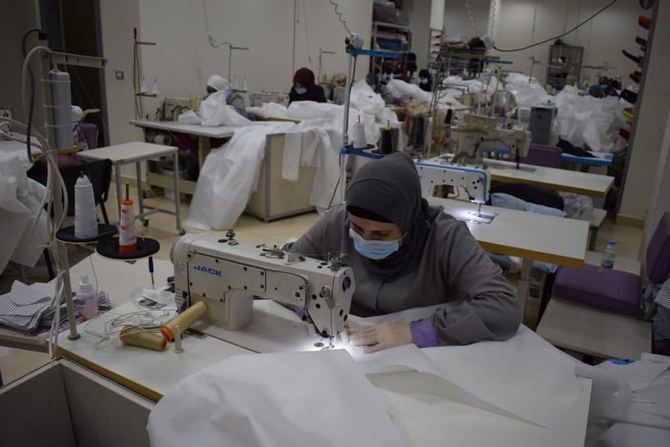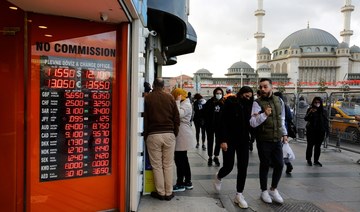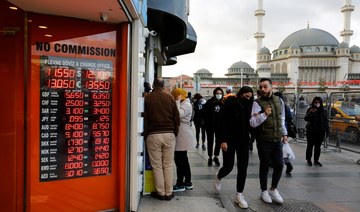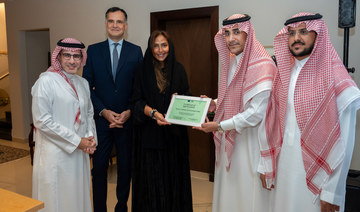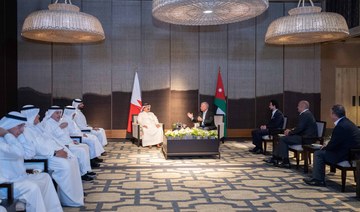BEIRUT: In the time of the coronavirus when most people were asked not to leave their houses and to work from home, some women in Lebanon’s Saida region chose to make protective suits at Machghal El Oum.
The workshop was established in 1994 to manufacture fashion items, embroidery and linen, but today Machghal El Oum is dedicated to the production of protective suits to counter the coronavirus threat.
The women who work there are doing a public service by helping the factory to cope with the surging demand for face masks in Lebanon.
“The idea was born with the spread of the coronavirus disease in Lebanon and the dire lack of supplies in the markets,” said Wafa Wehbe, manager of Machghal El Oum.
“We felt the need to help Lebanese society, especially after the closure of borders and airports and, consequently, the cessation of import of protective suits,” she said.
Research and many experiments have been conducted by Machghal El Oum in cooperation with engineers and specialists to discover the best type of fabric to prevents liquids and any kind of spray from reaching the wearer’s skin.
The fabric — such as titanium TNT, which blocks external elements — must also be available in the Lebanese market.
-----
READ MORE: A Tunisian apparel-retail entrepreneur rides the e-commerce wave
------
That is how about 20 women started working at Machghal El Oum, producing 400 protective suits a day, each requiring 15 to 20 minutes to sew.
There is an increasing demand for the suits, according to Wehbe, who adds that Machghal El Oum is currently cooperating with the Lebanese Red Cross and the World Health Organization.
Ghassan Hanqir, the director of public relations at the Islamic Welfare Association (which established the workshop), said that hospitals, pharmacists, relief agencies and restaurants placed orders for hundreds of suits daily.
He said that the price of a suit was symbolic and not for profit, but enough to purchase the required materials and pay the workers’ salaries.
The women at the workshop are from the marginalized and economically disadvantaged sections of Lebanese society.
When the workshop was founded 25 years ago, an applicant’s socio-economic status was used as the main criterion for hiring, Wehbe said.
“We provide work for women in need, who are divorced, widowed or refugees. Each year, we offer them six-month sewing courses, at the end of which we provide them with sewing machines.
“The highly qualified women are offered jobs in our workshop.”
FASTFACT
20
Number of women who started working at Machghal El Oum, producing 400 protective suits per day.
These women, in spite of their difficult circumstances, or perhaps because of them, did not seek to opt out during the coronavirus crisis.
They decided to put in hard work to meet the increasing demand for protective suits and items such as plastic masks and shoes, according to Wehbe.
She said that the management of Machghal El Oum took the safety of the women employees very seriously.
We felt the need to help Lebanese society, especially after the closure of borders and airports and, consequently, the cessation of import of protective suits.
Wafa Wehbe, manager of Machghal El Oum
There are currently 20 women working at a time, rotating based on a two-hour shift.
“We do not know whether or not we will increase the number,” she said. “We are working in a daily state of emergency that may change at any time.”
Wehbe said that the workshop was continuously sterilized; masks and gloves are provided; and temperature checks are carried out when the women arrive at the premises for work.
The seating arrangement is set up so the women are able to maintain a safe social distance.
Dr. Kamel Kuzbar, the Saida Municipality member responsible for tackling the coronavirus situation, praised and encouraged the women working at Machghal El Oum.
He said that the initiative aimed to address the problem of the lack of protective gear in the country.
Kuzbar said that the municipality cooperated fully with the workshop and other active institutions in its endeavor to take precautions and reduce the impact of the pandemic.
As well as cooperating with Machghal El Oum, he said, Saida Municipality was working to provide guidance, instructions and sterilization to the community.
It was also imposing home quarantine and distributing sterilization materials, food and medicine in areas of need.
In making these protective suits, the women of Machghal El Oum are doing their part to serve their country and its people.
- This report is being published by Arab News as a partner of the Middle East Exchange, which was launched by the Mohammed bin Rashid Al Maktoum Global Initiatives to reflect the vision of the UAE prime minister and ruler of Dubai to explore the possibility of changing the status of the Arab region.



